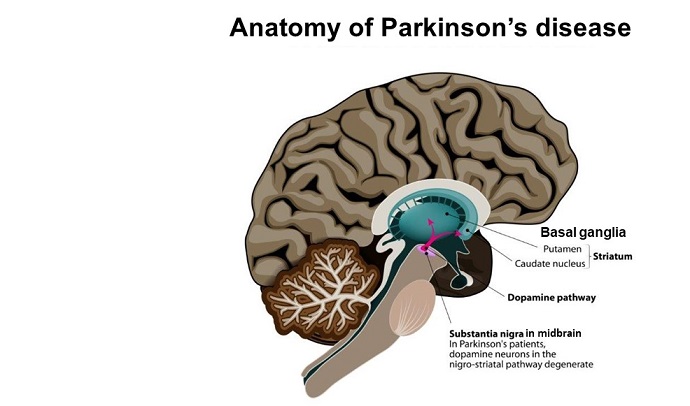
Parkinson's disease is a brain disorder characterized by shaking or resting tremor in the fingers, head and/or voice, muscle stiffness, and difficulty with walking, balance and coordination.
Parkinson's symptoms usually begin gradually and get worse over time.
As the disease progresses, people may have difficulty initiating walking and talking. They may also have mental and behavioral changes, sleep problems, depression, memory difficulties, and fatigue.
Both men and women can have Parkinson’s disease. However, the disease is 1.5 times more common in men than in women.
One clear risk factor for Parkinson's is age. Nearly 1% of the western population first develop the disease at about age 60. This rises to 4% by age 80 years1. The age-adjusted estimate for Sub-Sahara Africa (SSA) is lower than for Caucasians’2.
In Caucasians, about 5 to 10 percent of people with Parkinson's have "early-onset" disease, which begins before the age of 50. Early-onset forms of Parkinson's are often, but not always inherited, and some forms have been linked to specific gene mutations. The role of heredity in the causation of the disease in SSA remains to be fully studied.
What area of the brain is affected?
The region of the brain affected in Parkinson’s disease is an area of the brain known as the basal ganglia plus its associated connection including the midbrain. The basal ganglia is responsible for regulating movement and coordination.

Image credit: Shake It Up
A major chemical neurotransmitters involved is sending signals to the basal ganglia from the midbrain is dopamine. Dopamine is produced predominantly in nerve cells located in a collection of cells in the midbrain called the Substantia nigra. These cells project their fibers to connect with other cells in the basal ganglia in the regulation and coordination of motor movements.
Parkinson's disease is associated with degeneration of nerve cells in the midbrain resulting in low or inadequate production of dopamine.
Related:
References:
1. How common is Parkinson’s disease?
2. Epidemiology of Parkinsonism and Parkinson's disease in Sub-Saharan Africa: Nigerian profile
DATELINEHEALTH AFRICA INC., is a digital publisher for informational and educational purposes and does not offer personal medical care and advice. If you have a medical problem needing routine or emergency attention, call your doctor or local emergency services immediately, or visit the nearest emergency room or the nearest hospital. You should consult your professional healthcare provider before starting any nutrition, diet, exercise, fitness, medical or wellness program mentioned or referenced in the DatelinehealthAfrica website. Click here for more disclaimer notice.